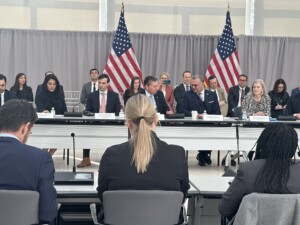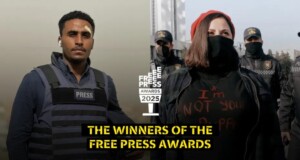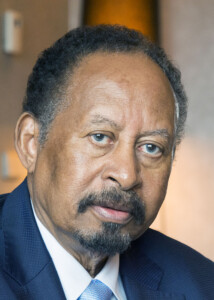Tripartite mechanism: First round of indirect negotiations started in Sudan
The Forces for Freedom and Change-National Accord group announced the start of the indirect round of talks on the Sudanese crisis. Separately, Khartoum resistance committees launched the ‘Charter for the Establishment of the People’s Power’.
 First round of indirect talks on the Sudanese crisis at the invitation of the tripartite mechanism (social media)
First round of indirect talks on the Sudanese crisis at the invitation of the tripartite mechanism (social media)
The Forces for Freedom and Change-National Accord group (FFC-NA) announced the start of the indirect round of talks on the Sudanese crisis, at the invitation of the tripartite mechanism, at the headquarters of the United Nations Integrated Transition Assistance Mission in Sudan (UNITAMS) in Khartoum yesterday morning. Separately, resistance committees from Khartoum launched the 'Charter for the Establishment of the People’s Power' on Wednesday.
Nour El Daim Taha, Deputy Secretary-General of the FFC-NA, said in a press conference that they held a meeting with the members of the UNITAMS, African Union, and Intergovernmental Authority on Development (IGAD) tripartite mechanism. The initiative aims to facilitate negotiations between different parties in Sudan to resolve current disputes.
Taha stressed that they are dealing with the initiative of the tripartite mechanism seriously and responsibly so that no parties are alone in making bilateral political agreements far from the consensus of the Sudanese.
He explained that the meeting discussed issues of membership of the Sovereignty Council, the government, the mechanism for electing the prime minister, the Legislative Council, the judiciary, commissions, the government's programme, completing peace, and other issues related to the roots of the current political and economic crisis.
In an interview with Sudan’s national television station, AU envoy and member of the tripartite mechanism Mohamed El Hassan Ould Lebatt said that the indirect dialogue between the Sudanese parties was launched this week. He expressed his hope that the dialogue period would not exceed 10 days, considering that time is pressing for Sudan.
Ould Lebatt stressed the necessity of forming a civilian government and of forming a constitutional basis and a programme that can be implemented as soon as possible.
He acknowledged the difficulties facing the tripartite mechanism but stressed that its mission has not failed yet. He explained that "some political components in the country have reservations about the presence of certain parties, but if civilians and military agree that these are excluded, the tripartite mechanism will respect that."
He pointed out that "dialogue means working at the same moment with civilians and the military alike, and not only with the political components."
'Dialogue means working at the same moment with civilians and the military alike, and not only with the political components' – Ould Lebatt
Ould Lebatt said that the official position of the Forces of Freedom and Change – Central Council (FFC-CC) is in agreement with the tripartite mechanism dialogue.
Some rebel movements and protest groups, including the Forces for Freedom and Chance – Central Council and the Resistance Committees of Khartoum, refuse to participate in a tripartite initiative of the United Nations Integrated Transition Assistance Mission in Sudan (UNITAMS), African Union, and Intergovernmental Authority on Development (IGAD) to facilitate negotiations between different parties in Sudan to resolve current disputes.
The groups refused to take part in a dialogue with the military coup authorities and those who support them as they fear that this will legitimise the coup.
Others, such as the Sudan Revolutionary Front (SRF), have called on the revolutionary parties to make concessions and engage in the dialogue.

in Khartoum, May 11 (social media)
New resistance charter
Amidst the divisions and disputes between the various rebel movements and protest groups, Resistance Committees from Khartoum have launched a new charter in an attempt to break with the current dominant opposition forces.
On Wednesday, young activists from the local Resistance Committees gathered in Khartoum to witness the signing of the 'Charter for the Establishment of the People’s Power' by their representatives.
The signing inaugurated “a new era of grassroots political practice,” Awadiya Suleiman wrote in El Sayha newspaper, reposted on Alrakoba.net.
“Looking at the current political situation, we find a big impasse, and a categorical rejection by the revolutionary forces of any political initiatives, agreements, or even steps towards a dialogue with the other components at the political level, especially the military.”
The resistance committees adhere to their rejection of the leadership of the Sudanese political parties, which constitute more than 90 percent of the signatories of the Declaration of Freedom and Change (announced in January 2019) and represent a large part of the member groups of the Sudanese Professionals Association, “reasoning that these parties, despite the support they found, failed to lead the transitional period to safety,” Suleiman explains.
'These parties, despite the support they found, failed to lead the transitional period to safety' – Awadiya Suleiman
“What the resistance committees put forward in the People’s Power Charter, is an advanced step in the framework of democratic transformation, as power should be returned to the people”.
“The great void in the absence of an executive authority in the country and a prime minister should lead every visionary or politician to go to this path that the resistance committees have gone”.
The charter further stipulated the overthrow of the coup regime, demanding that all those involved will be held accountable, including the civil and military forces, and the continuation of peaceful resistance through tried and innovative tools.
In 2020, the Khartoum Resistance Committees, the Communist Party of Sudan (CPoS), and the Sudanese Professionals Association, the driving force behind the December Revolution, all announced their withdrawal from the FFC, saying the FFC was “unfit to lead the formation of Sudan’s transitional Parliament”.











 and then
and then